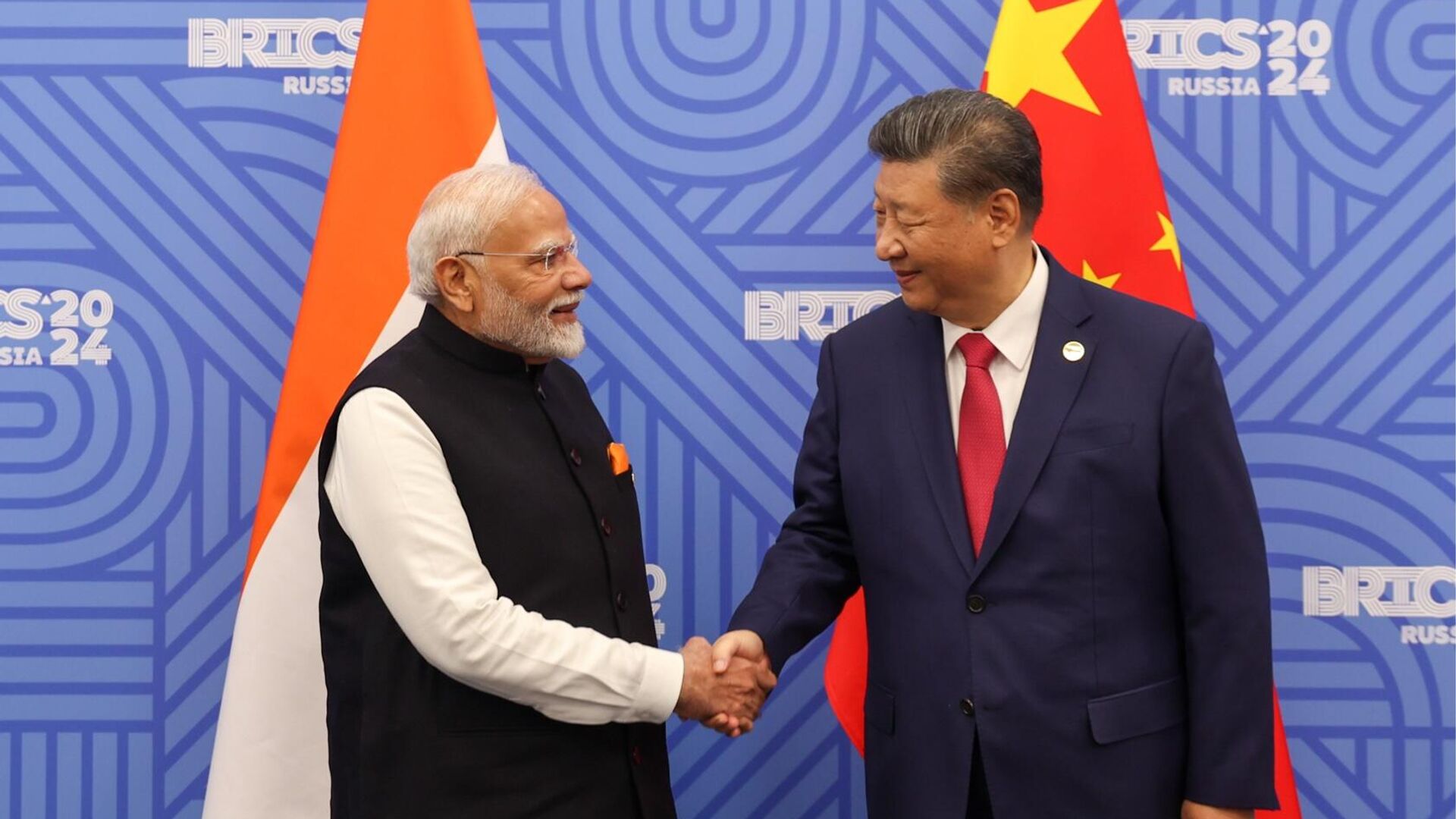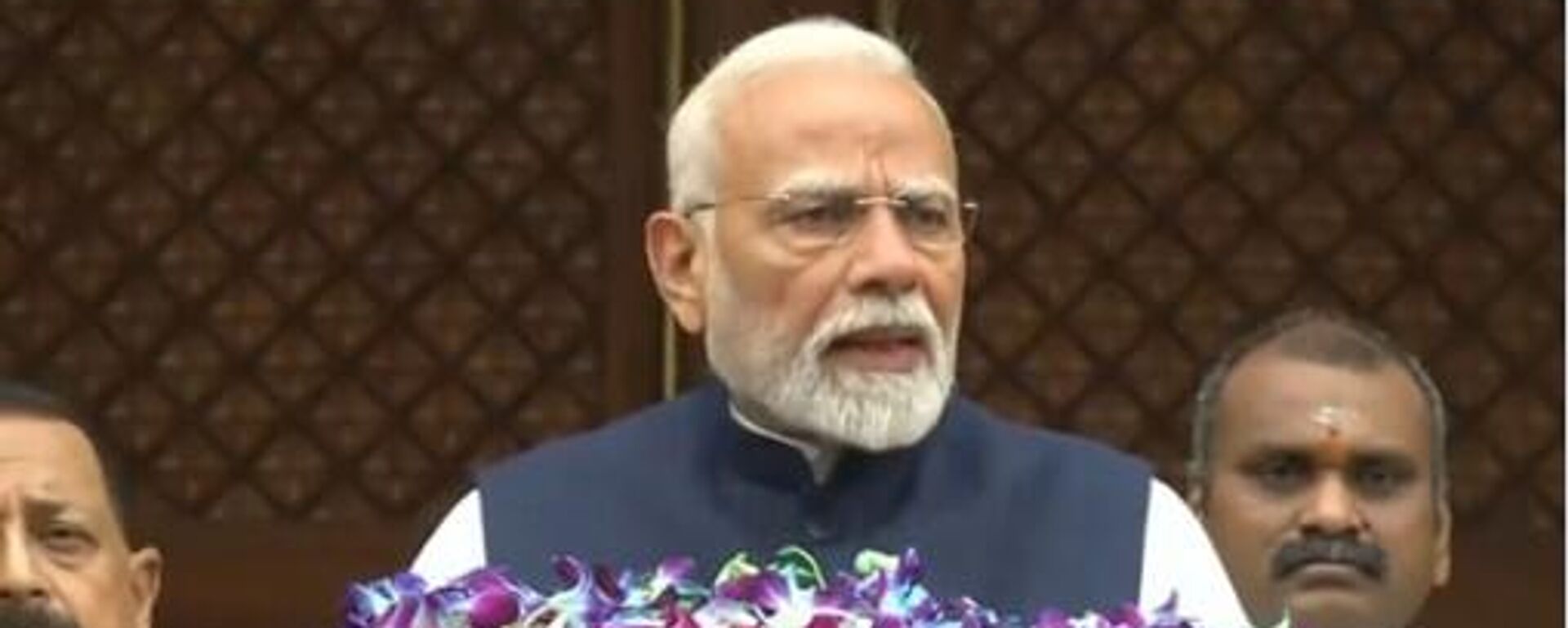https://sputniknews.in/20250807/us-actions-pushing-india-towards-closer-ties-with-china-9568559.html
US Actions Pushing India Towards Closer Ties With China?
US Actions Pushing India Towards Closer Ties With China?
Sputnik India
Relations between India and the US have nosedived in recent days, with the latter targeting the former with harsh tariffs for its time-tested ties with Russia... 07.08.2025, Sputnik India
2025-08-07T20:33+0530
2025-08-07T20:33+0530
2025-08-12T19:46+0530
sputnik opinion
bharatiya janata party (bjp)
shanghai cooperation organisation (sco)
india
us
china
narendra modi
washington d.c.
delhi
new delhi
https://cdn1.img.sputniknews.in/img/07e8/0a/17/8318081_0:761:1685:1709_1920x0_80_0_0_39804d404f611f12f45c9c66efe04e7c.jpg
Amid escalating tensions between India and the US, Indian Prime Minister Narendra Modi is scheduled to visit China at the end of this month, according to media reports. This will be his first trip to since the armed clash between Indian and Chinese soldiers in June 2020, which significantly strained relations between the two countries.The announcement about Modi's visit to attend the China-led Shanghai Cooperation Organisation (SCO) in Tianjin city from August 31 to September 1 sparked discussions on social media, wherein some users suggested that India was moving closer to China at America's expense. But Eerishika Pankaj, who serves as the Director of New Delhi-based think tank, the Organisation for Research on China and Asia (ORCA), believes that PM Modi's decision to attend the upcoming SCO summit in China should not be read as a tilt toward Beijing or as a retaliatory gesture against Washington. Rather, it reflects New Delhi's strategic autonomy in action.India remains clear-eyed about China, she said, adding that Modi's presence at the summit is a function of diplomatic pragmatism. It allows India to engage Eurasian partners, project leadership within the Global South, and avoid the perception of isolation—all while holding firm to its strategic priorities. The international relations analyst underlined that, rather than indicating a shift towards China or a distancing from the United States, this development underscores India's ability to independently navigate complex geopolitical dynamics, highlighting India's approach of managing its foreign relations on its own terms, without conflating partnerships or subordinating one alliance to another.India's engagement with China and Russia should be seen within its multi-alignment strategy. Russia, as a long-standing partner to both, plays a role in promoting diplomacy, the strategic affairs specialist noted."For the US, this evolving trilateral dynamic is a reminder that India is not a treaty ally but a sovereign actor operating on its own terms. Strategic autonomy does not preclude cooperation with the West, but it does entail flexibility in navigating partnerships across geopolitical fault lines. Any India–China cooperation remains cautious: both countries still see each other as competitors and use summits to manage rivalry rather than form a united front. In short, a warming of India–China ties would require Washington to recalibrate its India policy, but India's balancing act – aided by Russian diplomacy – means New Delhi retains freedom of choice," Pankaj stated.Likewise, Bharatiya Janata Party (BJP) politician Savio Rodrigues believes that while the US has the full right to safeguard its national interest and follow an America-First Policy, India, as a sovereign country, is also fully within its rights to follow the India-First policy.Unfortunately, the current US administration seems to have been misled by the advisors, who have impressed upon the US President that it is in the grips of an economic crisis, he added.So, Washington's only agenda for the last few months has been to get as much revenue as possible into American coffers, either through tariffs or through investments from allies and partners, in order to salvage the American economy from what they think might be an imminent collapse. The US President's visits to the Middle East and later Scotland should be seen in this light as well, the geopolitical expert emphasised.The current US administration's predicament can be understood and empathised with, but the manner in which Washington is targeting India is altering the bilateral relationship without any fault of India, he underscored.
https://sputniknews.in/20250807/ready-to-pay-a-personal-price-to-defend-indian-interests-pm-modi-on-us-tariffs-9563839.html
india
us
china
washington d.c.
delhi
new delhi
beijing
global south
russia
moscow
Sputnik India
feedback.hindi@sputniknews.com
+74956456601
MIA „Rossiya Segodnya“
2025
Pawan Atri
https://cdn1.img.sputniknews.in/img/07e6/0c/13/139630_147:0:831:684_100x100_80_0_0_8fa2b25903e7787fe6a2698552c167df.png
Pawan Atri
https://cdn1.img.sputniknews.in/img/07e6/0c/13/139630_147:0:831:684_100x100_80_0_0_8fa2b25903e7787fe6a2698552c167df.png
News
en_IN
Sputnik India
feedback.hindi@sputniknews.com
+74956456601
MIA „Rossiya Segodnya“
Sputnik India
feedback.hindi@sputniknews.com
+74956456601
MIA „Rossiya Segodnya“
Pawan Atri
https://cdn1.img.sputniknews.in/img/07e6/0c/13/139630_147:0:831:684_100x100_80_0_0_8fa2b25903e7787fe6a2698552c167df.png
bharatiya janata party (bjp), shanghai cooperation organisation (sco), india, us, china, narendra modi, washington d.c., delhi, new delhi, beijing, tariffs, global south, russia, moscow, russian oil
bharatiya janata party (bjp), shanghai cooperation organisation (sco), india, us, china, narendra modi, washington d.c., delhi, new delhi, beijing, tariffs, global south, russia, moscow, russian oil
US Actions Pushing India Towards Closer Ties With China?
20:33 07.08.2025 (Updated: 19:46 12.08.2025) Relations between India and the US have nosedived in recent days, with the latter targeting the former with harsh tariffs for its time-tested ties with Russia, including in the areas of energy security and defence.
Amid escalating tensions between India and the US, Indian Prime Minister Narendra Modi is scheduled to visit China at the end of this month, according to media reports. This will be his first trip to since the armed clash between Indian and Chinese soldiers in June 2020, which significantly strained relations between the two countries.
The announcement about Modi's visit to attend the China-led
Shanghai Cooperation Organisation (SCO) in Tianjin city from August 31 to September 1 sparked discussions on social media, wherein some users suggested that India
was moving closer to China at America's expense.
But
Eerishika Pankaj, who serves as the Director of New Delhi-based think tank, the
Organisation for Research on China and Asia (ORCA), believes that PM Modi's decision to attend the upcoming SCO summit in China should not be read as a tilt toward Beijing or as a retaliatory gesture against Washington. Rather, it reflects New Delhi's strategic autonomy in action.
"India's relations with the US and China run on separate, independent tracks, shaped by distinct priorities. While tensions with the US over tariffs and energy choices have sharpened, India is not using its SCO engagement as a bargaining chip. Instead, its participation affirms a long-standing commitment to multilateral diplomacy in a multipolar world," Pankaj told Sputnik India.
India remains clear-eyed about China, she said, adding that Modi's presence at the summit is a function of diplomatic pragmatism. It allows India to engage Eurasian partners, project leadership within the Global South, and avoid the perception of isolation—all while holding firm to its strategic priorities.
The international relations analyst underlined that, rather than indicating a shift towards China or a distancing from the United States, this development underscores India's ability to independently navigate complex geopolitical dynamics, highlighting India's approach of managing its foreign relations on its own terms, without conflating partnerships or subordinating one alliance to another.
"Closer India-China ties—if they were to materialise meaningfully—would certainly complicate Washington's Indo-Pacific calculus. Nevertheless, current dynamics reflect not convergence but coexistence. Pankaj stressed. "India's firm response to US pressure over Russian oil imports underscores its unwillingness to be coerced—by Washington, Beijing, or any other actor—into compromising national interest or autonomy."
India's engagement with China and Russia should be seen within its multi-alignment strategy. Russia, as a long-standing partner to both, plays a role in promoting diplomacy, the strategic affairs specialist noted.
"For the US, this evolving trilateral dynamic is a reminder that India is not a treaty ally but a sovereign actor operating on its own terms. Strategic autonomy does not preclude cooperation with the West, but it does entail flexibility in navigating partnerships across geopolitical fault lines. Any India–China cooperation remains cautious: both countries still see each other as competitors and use summits to manage rivalry rather than form a united front. In short, a warming of India–China ties would require Washington to recalibrate its India policy, but India's balancing act – aided by Russian diplomacy – means New Delhi retains freedom of choice," Pankaj stated.
Likewise, Bharatiya Janata Party (BJP) politician Savio Rodrigues believes that while the US has the full right to safeguard its national interest and follow an America-First Policy, India, as a sovereign country, is also fully within its rights to follow the India-First policy.
"India is neither against the US nor China. What it is trying to do is have independent, neutral relationships with every country based on its own national interest, in line with its policy of strategic autonomy and multi-alignment," Rodrigues, a former spokesperson of the federally ruling party's Goa unit, said in an interview with Sputnik India.
Unfortunately, the current US administration seems to have been misled by the advisors, who have impressed upon the US President that it is in the grips of an economic crisis, he added.
So, Washington's only agenda for the last few months has been to get as much revenue as possible into American coffers, either through tariffs or through investments from allies and partners, in order to salvage the American economy from what they think
might be an imminent collapse. The US President's visits to the Middle East and later Scotland should be seen in this light as well, the geopolitical expert emphasised.
"I believe that the US is taking a rather immature stand against India, which could backfire for it economically as well as on a geopolitical level. I can tell you that India will continue to look at the US as a friend, but that certainly doesn't mean that it could take India for granted. The relationship has to be based on shared and mutual interest and underpinned by mutual trust," Rodrigues observed.
The current US administration's predicament can be understood and empathised with, but the manner in which Washington is targeting India is altering the bilateral relationship without any fault of India, he underscored.
"If the US continues to bully India in an authoritarian manner, like it is, India will be left with no option but to put its foot down, like what we have witnessed in the official Indian statements. The US actions are creating fissures in the India-US relationship, which has remained fundamentally strong for the last two decades," Rodrigues concluded.



